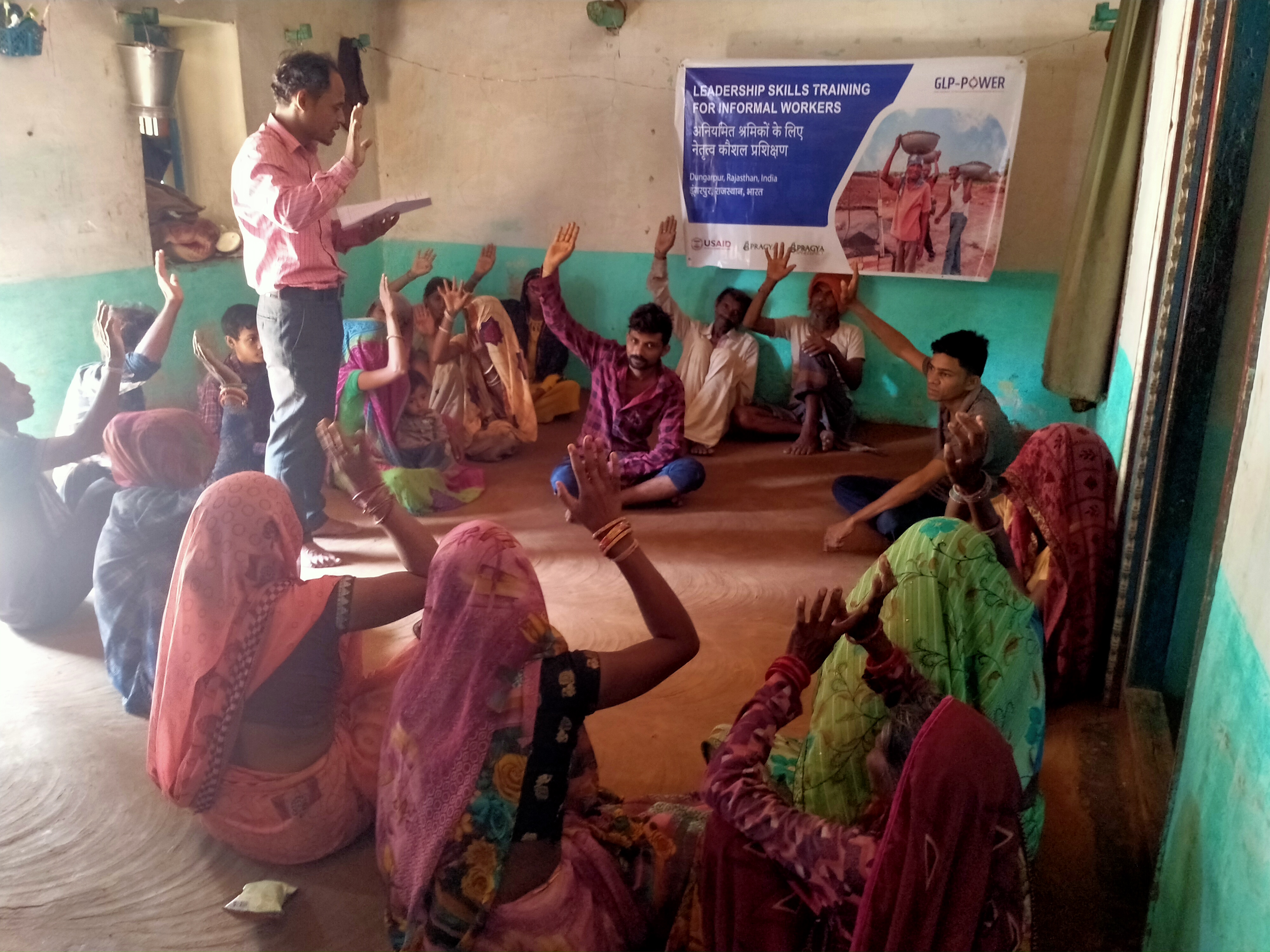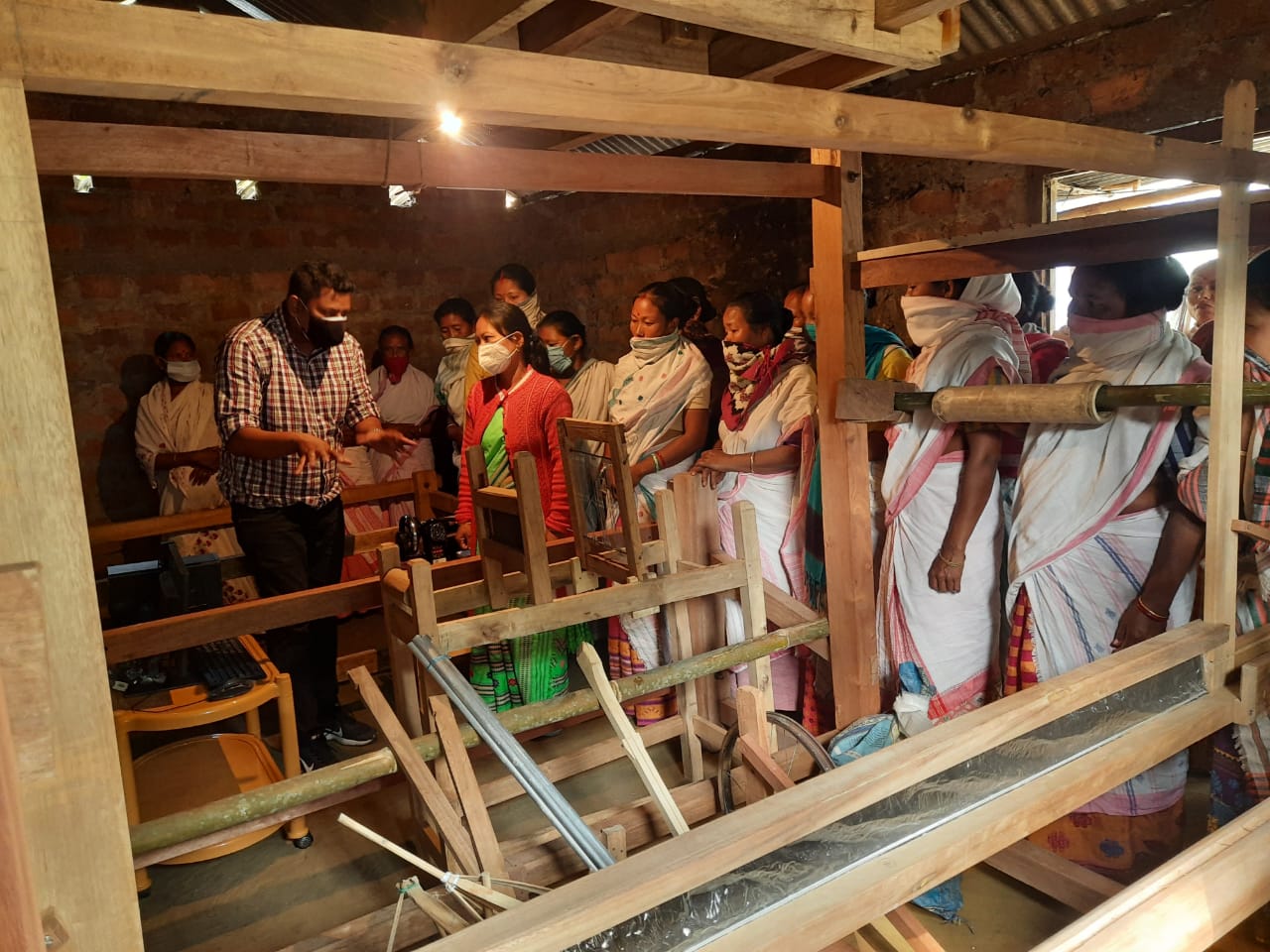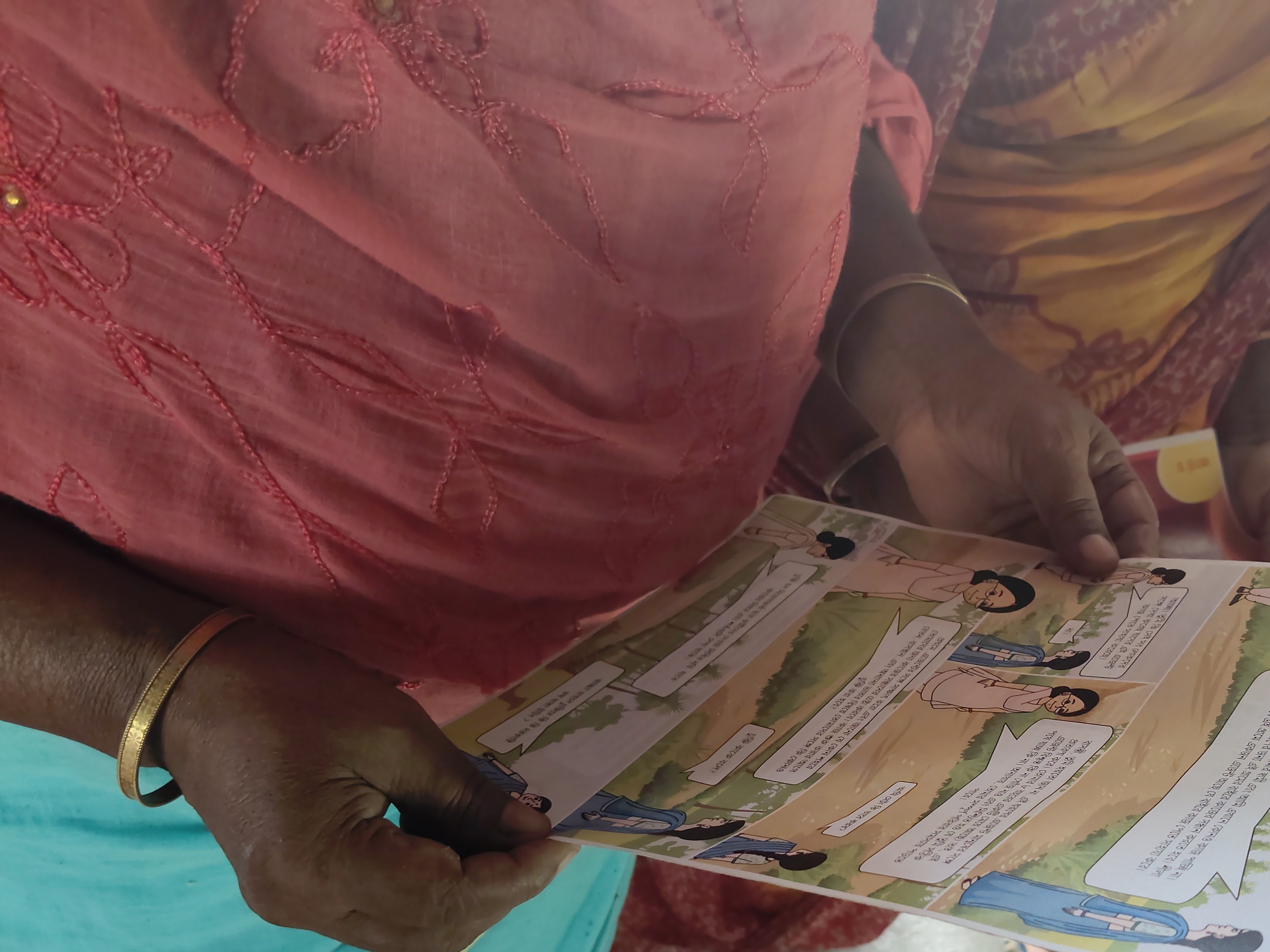Home / What We Do
Addressing Inequity
South Asia is rapidly emerging as one of the most industrializing regions in the world and this growth has spurred large-scale migration, with people seeking better economic opportunities. However, this migration is also driven by climate change, leading to a complex and multifaceted challenge. Unfortunately, these developments have come at a significant cost to human dignity, exacerbating historical issues and creating new problems in the region. Many of the employment opportunities are concentrated in the informal sector, where workers receive little to no benefits associated with formal employment. Much of the labour takes place under "sweatshop" conditions, with meagre wages and minimal social protection. South Asia is home to over 40 million migrant workers, many of whom live in conditions that amount to modern slavery. Legal protections for these workers are generally weak, especially for those in the informal sector who are often not even legally recognized as workers. They face significant institutional and societal barriers in accessing information, organizing, and securing collective representation, which leaves them vulnerable and marginalized. Women are disproportionately affected, earning lower wages than their male counterparts and facing higher risks due to systemic gender-based violence. They are also more vulnerable to human trafficking, commercial sexual exploitation and forced labour. Patriarchal values permeate workplaces too and gender-bias in the law-enforcers prevents effective prevention or redressal. Traffickers have well-laid channels and make good use of technology and the poverty and need of families, for their exploitative purposes. Pragya has been working to address these challenges, empowering workers with information, and organizing and empowering them, so that they receive fair wages, social security, and safe working conditions is the key. Women leaders are being trained for effective prevention and response, and survivors are being supported and organised for psychological and social rehabilitation. We are also bringing together governments, businesses, and civil society to collaborate to create a more just and equitable environment for all.

Addressing Inequity
Informal Workers
South Asia's rapid industrialization and urbanization have driven millions into the informal sector, which dominates the region’s labour market which are largely excluded from the protections and benefits of formal employment. Informal jobs are often characterized by unstable work arrangements, inconsistent pay, and hazardous working conditions. The lack of social protections like health benefits, paid leave, and job security leaves workers vulnerable to poverty and exploitation, often forcing them to work in substandard conditions just to meet their basic needs. These workers often find themselves in precarious positions, juggling multiple low-paying jobs to survive, and facing frequent health and safety risks. Workers' exclusion from formal labour laws hinders their ability to demand fair wages, better conditions, or compensation for injuries, entrenching a cycle of vulnerability and exacerbated health risks. The informal workforce is overwhelmingly composed of individuals from low castes, tribal communities, who remain largely invisible in mainstream policy discourse. Socially excluded groups not only encounter economic disadvantages, but also structural discrimination making them easy targets for exploitation by employers, who leverage these inequalities to suppress wages and deny basic rights. Informal women workers face even greater challenges within this context. They make up a significant portion of the informal workforce, especially in sectors such as domestic work, textile, and home-based industries. These women face gender discrimination in addition to the lack of labour protections, and they tend to receive lower wages than their male counterparts and are frequently subject to harassment and exploitation. Predominant in the most precarious sectors, such as domestic work, waste-picking, or informal manufacturing, women face heightened risks due to the intersectionality of their gender and social identity and are often subjected to wage discrimination and sexual harassment. As a result, women from marginalized communities find themselves trapped in the most hazardous and insecure forms of employment, with little hope of upward mobility or escape from poverty. Without formal recognition of their work or the ability to unionize, these workers have no collective bargaining power, further deepening their vulnerability. Marginalised groups and informal women workers are particularly impacted by these challenges.
Addressing Inequity
Informal Workers
Our efforts to address the issues faced by informal workers in South Asia are growing, with a range of initiatives focusing on organizing, capacity building, and legal support. One of the key efforts is the creation of a regional platform for informal workers to collectively organize and increase their bargaining power. By supporting grassroots movements and fostering solidarity and networking among informal workers, this platform provides workers with the necessary support to negotiate for better wages, working conditions, and legal protections. It improves their access to information on their rights, relevant laws and government schemes, and facilitates them to share and dialogue on specific issues, aiding the process of organizing and negotiation. It helps the workers to network, acting as a bridge and communication tool for workers who are often marginalized and excluded from formal labour protections and migrant workers who are geographically dispersed, encouraging them to come together to advocate for their rights. The development of mobile application, "CONNECT," is playing a key role in disseminating materials on empowerment, offering workers digital tools to enhance their organizational capacities. Through targeted training on digital technology, the project is opening new avenues for informal workers to engage in collective bargaining and advocacy. These efforts represent a significant step toward creating more just and equitable working conditions for marginalized workers across South Asia. At the grassroots, informal workers' collectives are supported with a range of capacity building initiatives. Leaders of the collectives are intensively trained on leadership and democratic processes and issue-based negotiation are facilitated for the collectives. Collectives in a district are helped to network around causes and mentors are groomed within each network of collectives to take up rights awareness building among workers and lead on advocacy with power-centres. Targeted programs that focus on informal women workers are promoting gender equity within the informal sector. Periodically, psychological counselling and legal support camps are organised for informal workers. This is particularly important for workers of marginalised sections and women, who face both gender discrimination and marginalization within the informal economy. By creating country-specific, multi-stakeholder discussions, Pragya’s efforts help develop inclusive strategies to address the unique challenges informal workers face, ensuring they are no longer excluded from support structures that could significantly improve their working conditions.
Addressing Inequity
Informal Workers
GEOGRAPHY / LOCATION

Addressing Inequity
Vocational Training
Marginalized groups in South Asia, particularly those from socially disadvantaged groups, tribal communities, and women, face systemic exclusion from education and job training opportunities, severely limiting their ability to participate in the formal economy. The lack of access to vocational training, which could equip individuals with practical, market-relevant skills, further entrenches their economic vulnerability. This gap in skills development leaves them trapped in a cycle of poverty, exploitation, and dependence on low-wage work, and also prevents them from gaining the bargaining power needed to demand fair wages or better working conditions. For women, particularly those in domestic work, textiles, and home-based industries, gender disparities in access to vocational education exacerbate the already existing inequalities. Informal women workers, who form a significant portion of the labour force in these sectors, often endure wage discrimination, harassment, and poor working conditions. This inability to access training perpetuates their economic marginalization and keeps them confined to dangerous and undervalued jobs, reinforcing the cycle of poverty and inequality. In addition, many women in marginalized communities are also hindered by cultural barriers, social norms, and gender roles that limit their economic participation.
Addressing Inequity
Vocational Training
Pragya has implemented several targeted interventions to address the systemic exclusion of marginalized groups from vocational education and employment opportunities. Digital and financial literacy form the core of these vocational programs, ensuring that participants not only gain practical skills but are also empowered to navigate the modern challenges and manage their finances independently. These skills help them access a range of economic enablers and are crucial for improving employability. One key initiative in the vocational training efforts is the use of the CONNECT app, which delivers sessions on various skills tailored to the needs of the workers. We are also conducting certificate courses on broad-range skills in collaboration with reputed institutes from the area that would make them employment-ready. In addition to general vocational skills, the training programs are designed to capitalize on regional specialties, further enhancing participants' chances of success. In-depth market research in the target areas precedes such training in order to identify the specific sectors with potential in each area, matching the training provision to those. Women's groups are provided with skills to set up small enterprises and manage businesses, with specific training on traditional crafts such as incense and candle making, jute bag production, and other handicrafts. These initiatives aim to equip women with sustainable skills, fostering both economic independence and the preservation of local artisanal practices. Further, these community enterprises are assisted with market information and buyer-seller meets help them to develop linkages with buyers for their products. Through these interventions, vulnerable communities are gaining the tools they need to escape the traps of poverty and exploitation, while contributing to the economic growth of their regions.
Addressing Inequity
Vocational Training
GEOGRAPHY / LOCATION

Addressing Inequity
Vulnerable Women
Women in South Asia face trafficking, exploitative labour, wage disparity, socio-economic disenfranchisement, violence, and lack of legal protection, especially in informal sectors. Trafficking for exploitative labour occurs in various informal sectors such as agriculture, construction, textiles, domestic work, as well as for sexual exploitation, including child marriages and prostitution. The area affected by these issues is vast, with the majority of the impacted women coming from marginalized communities, including those from socially disadvantaged groups, tribes, and minority groups. Informal workers in general face poor wages, job insecurity, and terrible living conditions. Women, in particular, bear the brunt of this hardship, often being employed in the most precarious, dangerous, and stigmatized jobs. Women, belonging to impoverished families and socially excluded groups, are often subject to trafficking for exploitative labour or bonded labour which forces them into subhuman working conditions with little to no access to protection, communication or representation. The interconnected nature of internal migration and trafficking exacerbates the precarious situation that disadvantaged women experience. With millions migrating from poor and underdeveloped regions in search of work, many fall prey to trafficking networks, as poverty, limited opportunities, and systemic discrimination force them into hazardous and degrading employment. They face frequent exposure to violence, discrimination, and isolation, and their lack of legal recourse exacerbates their vulnerability. Child, early and formed marriages for adolescents is also common in certain areas and communities and frequently is but disguised trafficking for sexual exploitation. The socio-economic conditions in South Asia, combined with deeply ingrained social prejudices implies that women and adolescent girls are socially conditioned to their ill-fate and have no awareness of ways to fight it, while inadequacies and weaknesses in law enforcement leave them with few recourses anyway.
Addressing Inequity
Vulnerable Women
Pragya’s interventions primarily tackle the issues of the socio-economic vulnerability of women and focus on prevention of human trafficking, gender-based violence, child marriage, and work for survivor empowerment, and protection through legal, social, and community support mechanisms. We have established Women's Information and Assistance Centres (WIACs) in various regions, offering a critical service bridge and providing information as well as support services for vulnerable women and girls. Helplines are proffering advice, and providing referrals for specific needs such as shelter, psychological or legal help. Pragya has also created and empowered Peer Support Groups for women which are well organised groups of local women leaders and other community women, equipped with legal information and government schemes to support and protect their communities. Leadership training for the women leaders includes inputs on women's rights and issues like trafficking and child marriage, coaching and counselling skills, and connections to protective services. The leaders are building awareness on safe migration and act as the first line for early detection and prevention of trafficking and child marriage. Our efforts to combat trafficking and violence against women extend to community-level engagement as well. Community workers, government and non-governmental organizations, are being identified and trained to collaborate with local departments and NGOs. These trained community workers, in coordination with law enforcement and government services, are positioned as first responders, equipped with the tools and knowledge to act quickly in cases of trafficking or child marriage. Law enforcement is also being trained to adopt more gender-sensitive and human rights-focused approaches, ensuring timely detection and rapid response to protect vulnerable women and girls across the region. Furthermore, we are striving to rehabilitate survivors of gender-based violence and trafficking, addressing their psycho-social healing and integration and need for redressal. This involves fostering survivors' collectives that enhance their agency, enabling them to verbalise and overcome their trauma, seek redressal, and also to take an active role in preventing further trafficking and supporting others in similar situations. We also aim to help survivors access decent work opportunities, which not only reduces their exposure to risks but also empowers them to resist re-trafficking and violence. Through these survivor collectives, women woild be encouraged to advocate for themselves and influence duty-bearers in anti-human trafficking efforts, creating a network of empowered voices that can bring about systemic change.
Addressing Inequity
Vulnerable Women
GEOGRAPHY / LOCATION
